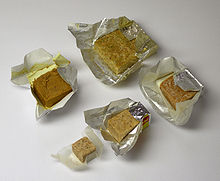- Bouillon cube
-
A bouillon cube [ˈbuːjɒn kjuːb] (US) or stock cube (Australia, Ireland, New Zealand, UK) is dehydrated bouillon (French for broth) or stock formed into a small cube about 15 mm wide. It is made by dehydrating vegetables, meat stock, a small portion of fat, salt and seasonings and shaping them into a small cube. Dehydrated broth is also available in granular form.
Broth made from rehydrated cubes is different in taste from fresh broth because of its higher salt content and flavours changed by the boiling process. Bouillon cubes are convenient and inexpensive but have little nutritive value.[1] The cubes are widely used in English cooking to add flavour, particularly in soups, stews and casseroles, as it often contains flavour enhancer, be it as monosodium glutamate or disguised as "yeast extract".
Bouillon cubes were commercialised by Maggi in 1908 and by Oxo in 1910 as a cheaper version of meat extract. By 1913, there were at least 10 brands available, with salt contents of 59–72%.[2]
Its invention is attributed to Nicolas Appert in 1831,[3] but the principle was known long before and called portable soup.
Common brands include Oxo, Knorr, Rose Hill, Jumbo brand (Gallina Blanca), Maggi, Hormel's Herb-Ox, Wyler's, Goya, Mazola and Kallo.
See also
References
- ^ "The Value of Beef Essences", Medical Review of Reviews 20 January-December 1914, p. 185 Google Books
- ^ "Bouillon Cubes - Journal of Industrial & Engineering Chemistry (ACS Publications)". Pubs.acs.org. 2002-05-01. http://pubs.acs.org/doi/abs/10.1021/ie50060a009. Retrieved 2010-05-31.
- ^ Canning food - todayinsci.com
Categories:- Food ingredients
- Dried foods
- Convenience foods
- Umami enhancers
Wikimedia Foundation. 2010.

